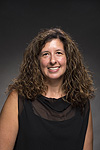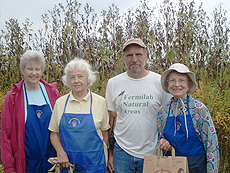Thank you, Mike Becker
 |
|
Jolie Macier
|
Jolie Macier, Site Services Department manager, wrote this column.
Science is Fermilab's mission, and everyone at the laboratory contributes to it at some level. Whether those of us in the support sections can explain the details or not, we know the scientific achievements are significant, exciting and meaningful.
Serving as stewards of a large laboratory site, whether maintaining facilities or managing the land, is our responsibility, but it is also something we are proud of. We all take pride in being America's particle physics laboratory.
FESS Roads and Grounds Manager Mike Becker has carried out that responsibility for nearly 40 years. Mike is planning to retire later this year, so it is a perfect time to publicly acknowledge his contributions to Fermilab, its employees and its scientific operations.
Our large, park-like site is a treasure to the region and, with its many diverse ecosystems, requires deliberate management. When visitors come to our site — even those from other laboratories — they inevitably remark on how beautiful the site is, how it doesn't feel industrial. That is no accident.
Mike has been at the center of efforts to manage the laboratory land responsibly. With the support of groups such as the Ecological Land Management Committee (and the Prairie Committee before it!), which advises the laboratory director about land management, Mike has perpetuated the notion of site stewardship that goes back to Fermilab's first director, Robert Wilson, who deliberately drew upon the expertise of Northeastern Illinois University professor Robert F. Betz to create a prairie on the Fermilab site in 1975.
Just over a week ago, we continued that effort by hosting approximately 200 volunteers at the annual prairie harvest, now in its 37th year. At that event, Mike helped coordinate activities, instructing groups of volunteers in the seed collection effort and stepping in wherever necessary.
Beyond Mike's efforts to enrich the laboratory's natural areas — through the volunteer harvests or advanced land management techniques such as prescribed burning — he has embodied the notion of stewardship in many Roads and Grounds activities.
Even the winter green-cone program is an example of Mike's stewardship contribution. The green traffic cones that mark restricted parking lots around the site help minimize fuel usage throughout the winter. Similarly, the site mowing efforts are planned to optimize labor effort and minimize fuel usage, with intervals planned so as to preserve wildlife habitats and minimize the growth of woody vegetation.
It's been 38 winters since August 1974, when Mike joined Fermilab. That's 1,583 inches of Chicago snow, six Fermilab directors and lots of baby bison. Thanks so much for all of your work, Mike!
 |
Roads and Grounds Manager Mike Becker met with volunteers from the Batavia Women's Club at the Oct. 5 prairie harvest. Photo: Tricia Bethke, Fermilab Natural Areas
|
|